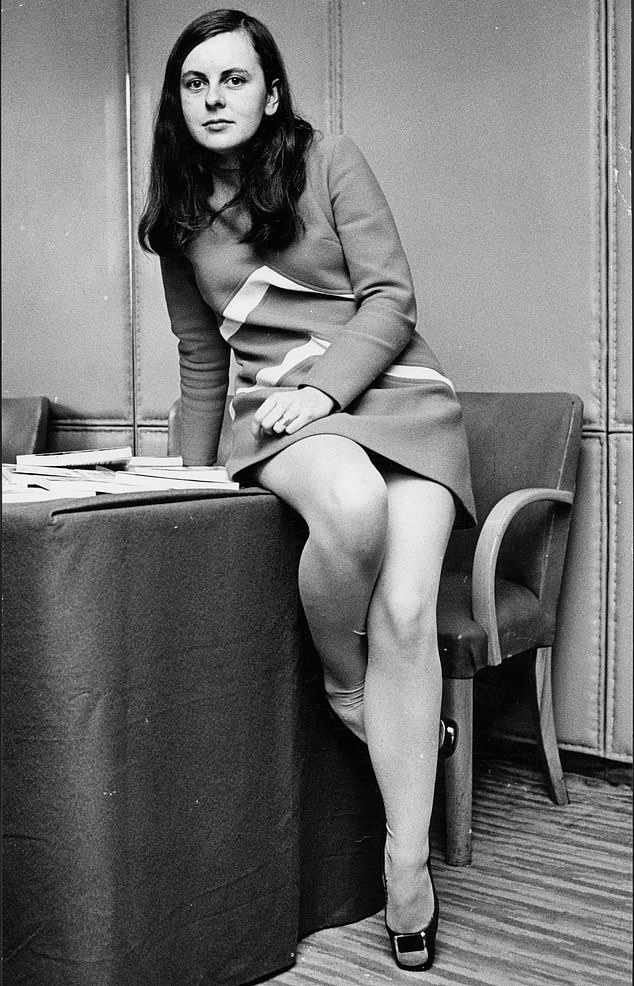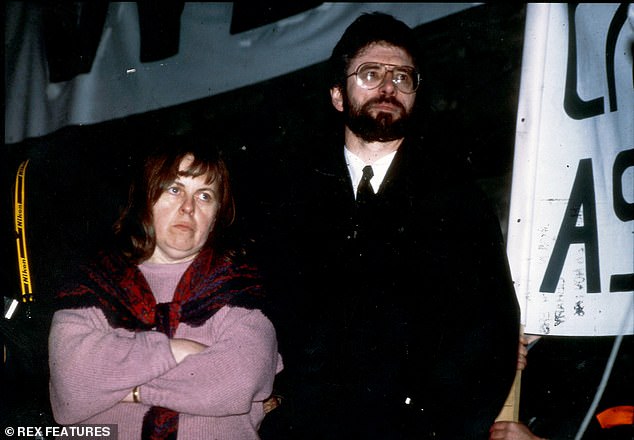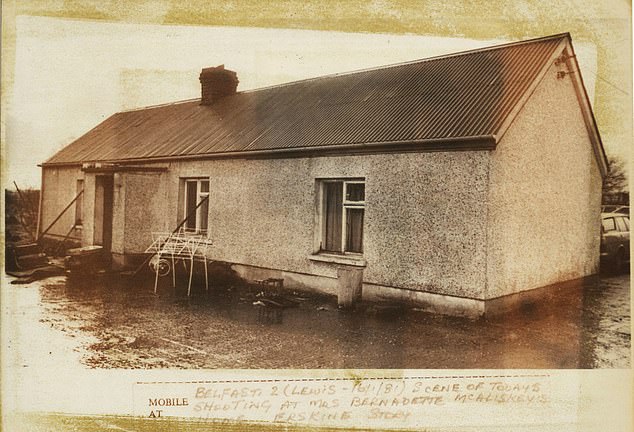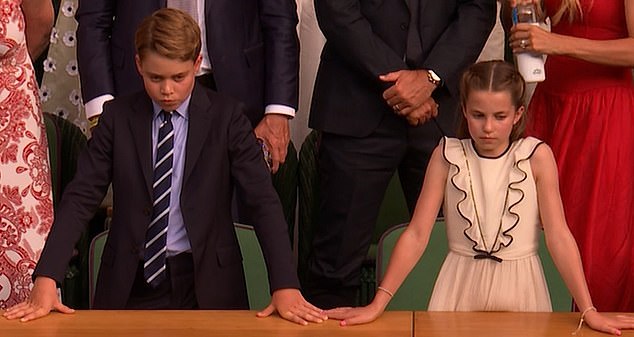He saw a lot of grim scenes in 20 years of active service all over the world, yet this one remains stuck in his mind more than 40 years later.
‘It was a nightmare inside there,’ recalls a soldier whom we will call Andrew. ‘There was the husband on the kitchen floor with blood spurting out of an arterial wound. The children were screaming and their mother was in the bedroom with at least six bullets in her.’
Fortunately, she was still alive – just.
It was January 1981 on a snowy Northern Irish dawn at the bottom of a dead-end track in rural County Tyrone. Andrew was in charge of a three-man military observation team who had only just disarmed the gunmen responsible for this carnage.
It was now very clearly a life-or-death situation. Andrew had to summon immediate medical aid, without which the parents of those screaming children would soon be dead. He also needed military back-up as soon as possible, in case the terrorists received reinforcements or twigged that they actually outnumbered their captors.
The gunmen had severed the telephone line to this remote bungalow and the soldiers’ radio wasn’t working. Having despatched one of his men to run off in search of the nearest house to ring for help, he was left with one other soldier to manage three angry terrorists, three hysterical children and two critically wounded civilians. Thanks to Andrew, however, those children would not become orphans that day.

Bernadette Devlin (nee McAliskey), MP for Mid Ulster
His swift actions also averted major civil unrest. For that young mother was Bernadette McAliskey, one of the most high-profile Republican sympathisers in Northern Ireland. Up until now, even she has not heard the full story – revealed today by the Mail.
A few years earlier as Bernadette Devlin, she had been the youngest MP in the House of Commons. There, she went down in history for crossing the floor of the House to hit the Home Secretary in the face after stating that the Parachute Regiment had acted in self-defence when they killed 13 civilians on ‘Bloody Sunday’ in 1972. She had since married teacher Michael McAliskey and the couple had three children aged nine, five and two.
Her would-be killers were a hit squad from the outlawed loyalist Protestant paramilitary, the Ulster Defence Association. As it was, the attack prompted vicious reprisals from the Catholic Irish Republican Army. Had she died, however, there would have been sectarian mayhem. This was the height of ‘the Troubles’ and inter-community tensions were already at boiling point.
There have been numerous conspiracy theories ever since, including a popular nationalist narrative that Bernadette was under observation from a unit of the hated Parachute Regiment who made no effort to save her from a loyalist death squad. Years later, in a 2002 interview with the Mail’s Geoffrey Levy, she attributed the couple’s survival to a passing patrol of the Argyll & Sutherland Highlanders. Today, however, the Mail can reveal what really happened that horrific morning.
For the men who saved Bernadette and her husband that day were from the one Army unit which Irish republicans hated even more than the Paras. They were from the Special Air Service.
And now the man in charge of that operation – ‘Andrew’ – has decided to speak out. He has done so with heavy heart as he has spent more than 40 years keeping his memories to himself, according to the regimental code of honour.
But the current Left-wing rewriting of the history of the ‘Troubles’ in Northern Ireland, repainting the Special Forces as villains and besmirching the reputation of ‘the Regiment’, has goaded this taciturn 70-year-old soldier beyond endurance.
He is appalled by the prospect of publicly funded human rights lawyers dragging Army veterans into the dock in pursuit of compensation for convicted terrorists and their families.
He is furious that Sir Keir Starmer claims the current British law designed to protect veterans is ‘unlawful’ – as he did again last week – because it clashes with a European one. Emboldened by the Daily Mail’s ‘Stop The SAS Betrayal’ campaign, he wants to show that, far from being some sort of rogue unit, the SAS were there to save lives – even those of the people who loathed them.
Andrew was a 26-year-old corporal with six years in the SAS behind him when the call came through in January 1981 to mount an observation operation on the McAliskey home – overnight.

Bernadette Devlin with Gerry Adams at the Bloody Sunday rally
‘We were very busy in those days. This was what we called a ‘fast ball’ operation,’ he says. ‘I had spent the day protecting a Belfast councillor during his constituency surgery. Then this job came in for that night. There was information of a threat to a celebrity politician. I learned afterwards that she knew she was on a hit list.
‘There wasn’t time to do a background study on the situation. We were just dropped off in the early hours of the morning and left to make an approach march to a grid reference where this bungalow was situated.’ There was no question of walking up the lane. The three soldiers had to make their way in the dark for miles through driving snow around a peat bog.
Their orders were to establish an observation position as close to the bungalow as possible, staying out in the open, regardless of the weather, for up to a week (a standard operational procedure known as ‘hard routine’). Each man was armed with an Armalite M16 rifle and a Browning 9mm semi-automatic handgun. The plan was to keep watch round the clock, taking turns to sleep. They had only just arrived at first light and were still doing their initial circuit of the property, known as a ‘360’. This had just become more problematic following the discovery that the couple were breeding greyhounds in an outbuilding and the dogs had started barking, at which point the three soldiers could see a Hillman Avenger driving up the lane towards the house.
The car was carrying three members of the UDA, Andrew Watson, Thomas Graham and Robert Smallwood, armed with a Smith & Wesson revolver and two 9mm Brownings. Leaving the engine running, they had jumped out. Two were smashing in the door to the bungalow with sledge hammers while a third set about tearing down the telephone line.
Inside, Michael McAliskey had already seen a man in a balaclava through a window and yelled at his wife to hide under the bed. He rushed to the door and was trying to hold it back but the gunmen prised it open. A pistol was thrust through the gap and bullets started flying. He was hit in the arm and the gang pushed on into the house, one shooting at Michael – now on the floor bleeding and pretending to be dead.
Another man went in search of Bernadette and found her in the bedroom. He fired at least six shots into her back, chest, legs and arms (some reports say as many as nine), leaving her for dead wedged in the gap between the bed and the wall where she had tried to hide. The children, unharmed, were in deep shock.The two gunmen ran for the car, just as the driver had managed to pull down the telephone cable with a rope. They were suddenly face to face with ‘Andrew’ and his two colleagues, their M16s raised and ready to fire.
‘We were seven or eight metres away and it was face on face like two charging bulls. We had every right to drop all three of them,’ says ‘Andrew’. ‘But we had shock on our side and we were more assertive. We were all in Army camouflage shouting, ‘Security forces. Put down your weapons’. They could see it was a case of comply or die – so they complied.’ Andrew ran inside, saw Michael on the floor and three children ‘running around, hysterical’ before finding Bernadette.
Despite suffering multiple bullet wounds and now being confronted (while naked) by a second armed stranger in the space of a minute, the famously forthright political campaigner was still defiant. ‘I suppose you bastards are coming in to finish me off,’ she groaned. ‘I didn’t say who we were. I couldn’t help her with this great hole in her chest. I just told her help was on its way,’ Andrew recalls. Then he turned his attention back to Michael. ‘We didn’t have any drips or tourniquets. I just told him to keep the pressure on his arm to stem the bleeding.’

Home of Bernadette Devlin in Coalisland, County Tyrone, where in 1981 she was attacked by members of the Ulster Freedom Fighters
The immediate problem was communications. As they were running towards the house, Andrew had issued the signal: ‘Contact! Wait out!’ This was the all-important alert telling HQ that his unit was going into action, to clear the airwaves, to await his next update and to have reinforcements despatched immediately. ‘But communications just ended with my transmission. I never got the confirmation back that they had heard us.’ Did anyone even know they were there?
With no phone and no radio (standard-issue Army transmitters were notoriously unreliable in freezing weather), there had been no option but to send one of his two men to run off in search of a telephone.
‘Luckily, as it turned out, the unit had heard my ‘Contact! Wait out!’ and had already deployed a quick-reaction force from the resident unit in Dungannon,’ says Andrew.
A company from the Argyll & Sutherland Highlanders were on the ground inside 15 minutes, followed swiftly by a helicopter to take the McAliskeys to hospital. ‘Then we handed over the scene,’ says Andrew, ‘and extracted ourselves.’ Having had no sleep for more than 24 hours, he returned to barracks for a shower and the mandatory debrief with the police and the military legal team. Then it was on to the next task.
A year later, ‘Andrew’ would be in the thick of the action in the Falklands War, shortly after the terrorists had received sentences (life for ringleader Watson, 20 years for Graham and 15 years for Smallwood, who was later murdered by the IRA). Andrew never heard from Bernadette, who would always maintain that he and his men were from the hated Paras, had no interest in saving her and had made no effort. ‘Had it been left to the Paras, I would be dead,’ she told the Mail in 2002, claiming that it was the Argylls who saved the day. ‘Rob the medic saved our lives. He called a military helicopter and got the Paras to hand over their medical packs to stem our wounds.
‘The Paras were confused and paralysed. It was the Argylls who took control and we did not die.’
She also gave a crystal decanter to the military surgeon whose brilliant handiwork in hospital had saved both her and her husband (even though the doctor was a Para).
One can but wonder what Bernadette would say if she knew what really happened that day. The Mail has approached her for comment.
In such horrific circumstances, she can be forgiven for not knowing who was who. She showed commendable fortitude that day simply by keeping herself alive – and even cracking a joke. Having become disillusioned with politics and politicians, she would go on to devote her life to social projects in South Tyrone, as she still does. Despite her lifelong condemnation of the British state, this tenacious activist would never hesitate to attack Sinn Fein, the IRA and the Irish government, too, for letting down their own people.
The horrors of that day left their mark on all the family, including Bernadette’s daughter, Roisin, who later spent some time in jail, while pregnant, fighting extradition to Germany following a 1996 IRA mortar attack on a British Army base (repeated extradition attempts by the Germans were ultimately denied by a British judge).
The attack on the McAliskeys also led to savage reprisals by the IRA. Days later, an eight-man unit murdered 86-year-old First World War hero and retired politician Sir Norman Stronge, 86, along with his only son, James, in the family home, Tynan Abbey. The murderers then torched the place to the ground.
But the aftermath could have been far worse had Andrew and his team not done what they did that January day in County Tyrone. While he is fiercely proud of the SAS, he plays down his own role. ‘We just did our best in the circumstances. And it didn’t matter which side the attackers were on. They were just terrorists as far as I was concerned.
‘We had every justification to shoot them but we showed constraint. If our actions had been different, then I might now find myself in the dock. But I’ve not said anything since.’
So why talk now? ‘Because now is the time to talk.’












